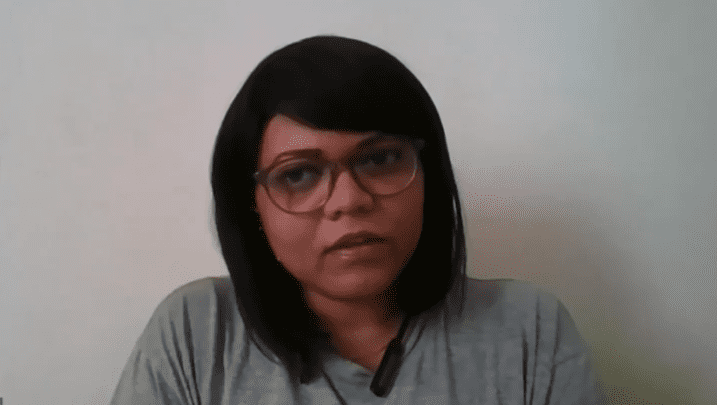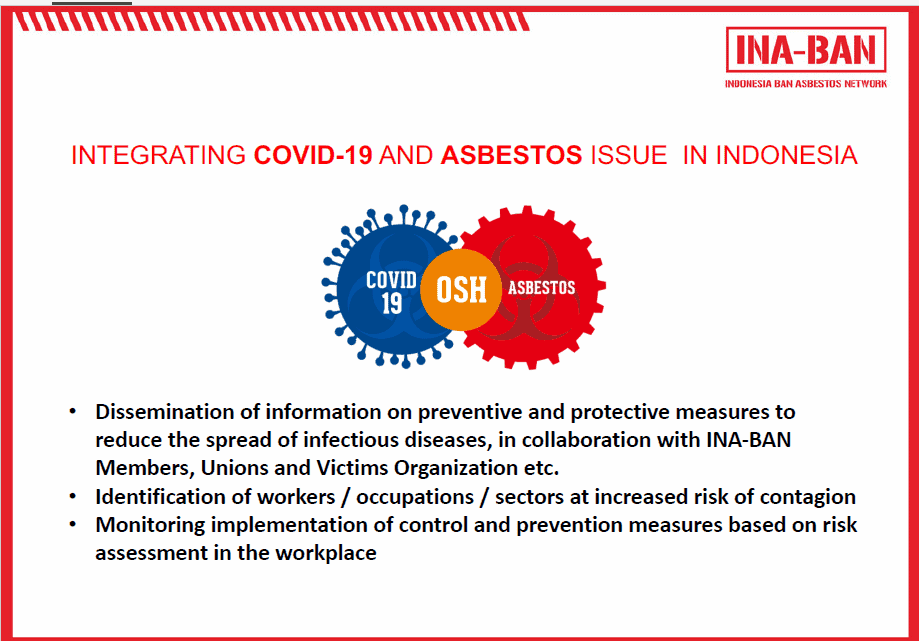Asbestos Ban Update: Campaigning in a Global Crisis Webinar
On 23 July 2020, Union Aid Abroad – APHEDA hosted the Asbestos Ban Update: Campaigning in a Global Crisis webinar. The webinar was chaired by Union Aid Abroad – APHEDA Executive Officer, Kate Lee, who was joined by Pooja Gupta from the India Ban Asbestos Network (IBAN), Mochamad Darisman from the Indonesia Ban Asbestos Network (INA-BAN), and Liam O’Brien from the Australian Council of Trade Unions (ACTU).
Ban Asbestos Campaign takes on new level of urgency during COVID crisis
Attendees joined the webinar from Australia and across the world, to hear that while COVID-19 has changed the way we live, work and travel, the campaign to ban asbestos has taken on a new level of urgency during the crisis. In response, Union Aid Abroad – APHEDA has started a campaign to pressure Multilateral Development Banks to ensure no COVID-19 health funding or economic stimulus funding is used to buy asbestos products and support the toxic asbestos industry.
Ban Asbestos Update: India
Pooja Gupta laid out the activities, goals and analysis of the ban asbestos campaign in India. IBAN was formed in 2017 and its key goal is to eradicate asbestos in India and to bring about a just and fair transition for the asbestos industry. IBAN has built a coalition of NGOs, Asbestos Related Diseases victims, doctors, lawyers, Trade Unions and academics and researchers, who engage with state governments, the central government, judicial bodies and international organisations including the Multilateral Development Banks.

Asbestos, government sanitation programs, and funding by international banks
Pooja spoke about the opportunities for the campaign in targeting the international banks financing construction that supports the asbestos industry, to undermine the power of the lobby and exporting countries. IBAN has been collaborating with APHEDA in the international campaign to end asbestos use in Multilateral Development Bank projects.
Pooja also presented some analysis from IBAN on the ports in India with the highest risk of exposure to asbestos for workers. She also highlighted an alarming case study of how government sanitation programs are promoting the use of asbestos products in communities.
Pooja ended by summarising the current plans to demand identification, care and compensation for asbestos victims in India, particularly in the state of Rajasthan where more rapid and proactive screening, as well as a Victim Care Model is needed.
The webinar was planned to include showing the trailer for the documentary ‘Breathless’ about asbestos in India but unfortunately time ran out. View the trailer here.
Ban Asbestos Update: Indonesia
The second speaker, Muchamad Darisman (INA BAN and LION), will be well known to some of our Australian audience. Darisman has participated in two speaking tours in Australia over the last few years to share information on the asbestos campaign in Indonesia with Australian audiences. He presented some up-to-date information from Indonesia as well as analysis on how the COVID-19 crisis is affecting asbestos victims and an update on the campaign.

Indonesia: integrating the approach to asbestos and COVID-19
Darisman’s presentation included information on INA-BAN’s plans on integrating their approach to asbestos and COVID-19. In Indonesia, like many other countries that still use asbestos, there is low diagnosis of asbestos related diseases. People who have weakened lung capacity due to asbestos exposure are an invisible vulnerable population in many communities who must be identified and treated.
The upcoming priorities for INA-BAN are organising Victims Groups, lobbying the government at different levels and organising with unions.
Asbestos Update: Australia
The final speaker was Liam O’Brien, Assistant Secretary of the ACTU, who spoke about the relationship between Australia’s context regarding asbestos, the achievements and goals of Union Aid Abroad – APHEDA’s Asbestos. Not Here. Not Anywhere. campaign and the union movement’s support of the global ban asbestos campaigns.
Liam highlighted the need to continue to combat the misinformation from the asbestos industry on the ‘safety’ of asbestos products. This includes in international forums such as at the Rotterdam Convention meetings where a small number of countries with a financial interest in asbestos block the listing of white asbestos as a hazardous chemical.
The importance of strengthening the global movement to ban asbestos
Liam discussed the importance of collaboration and cooperation in Australia, as well as overseas, to build and strengthen the movement to ban asbestos.
The question and answer session at the end of the webinar continued to pull out the nuances of the different strategies being implemented and share more detail on the speaker’s comments.
How you can support the campaign!
- For people who aren’t members of Union Aid Abroad – APHEDA, you can support the campaign by becoming a Union Aid Abroad – APHEDA member and making a regular donation.
. - If you are a member, we’re asking you to reach out to your community to ask three friends to join you in becoming a member.
. - Sign our petition to ask the World Bank, Asian Development Bank and Asian Infrastructure Investment Bank to commit to not letting any COVID-19 relief or related stimulus be spent on asbestos products.
For more information on the asbestos campaign you can look at our campaign website with information and ways to get involved at or contact Emma Bacon on ebacon@apheda.org.au